Online Salesforce Training Program
Ready to land your dream Salesforce job? Whether you're starting fresh or leveling up
Take the first step towards your dream job today!
30,000+ Thriving Careers Started Here - Yours Could Be Next!





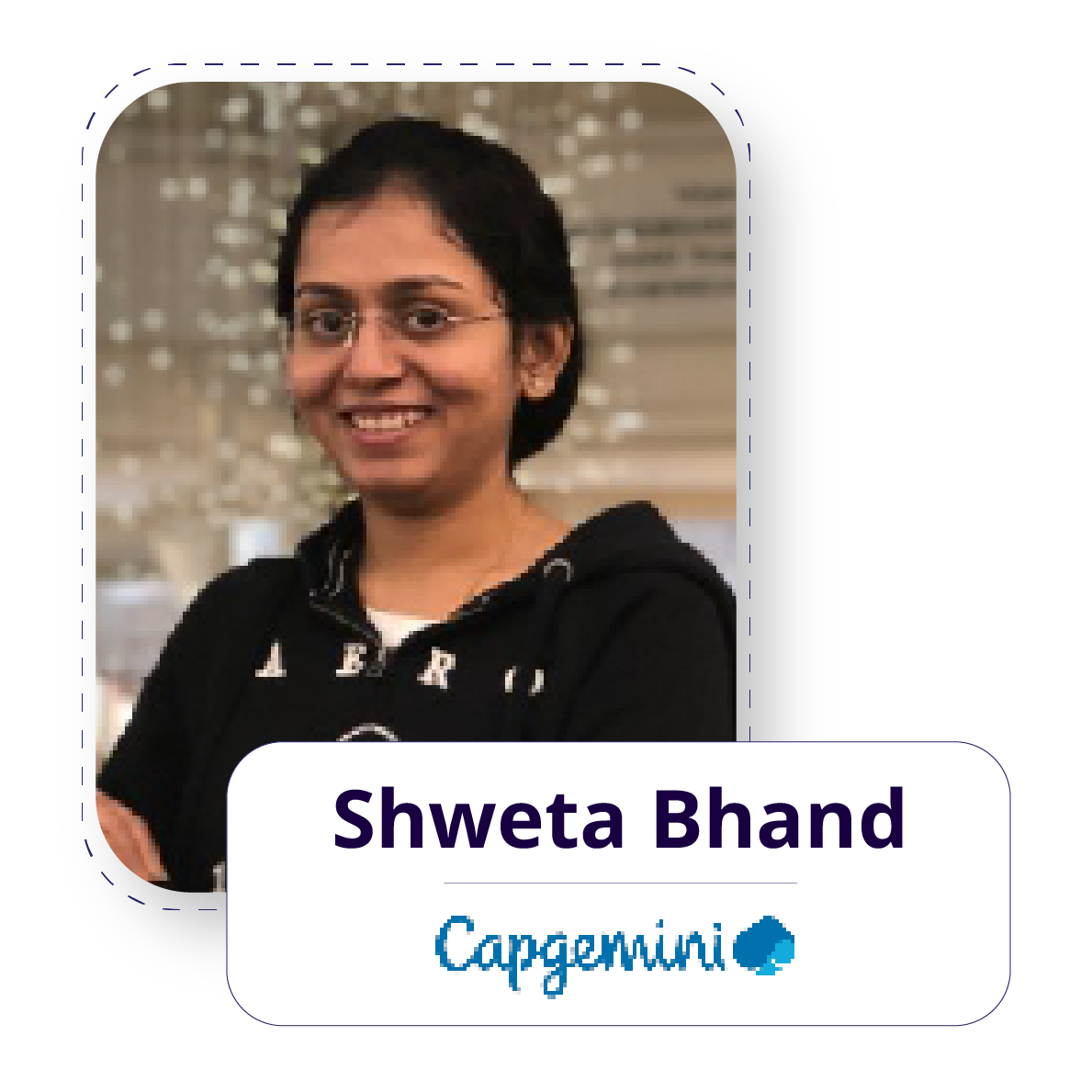


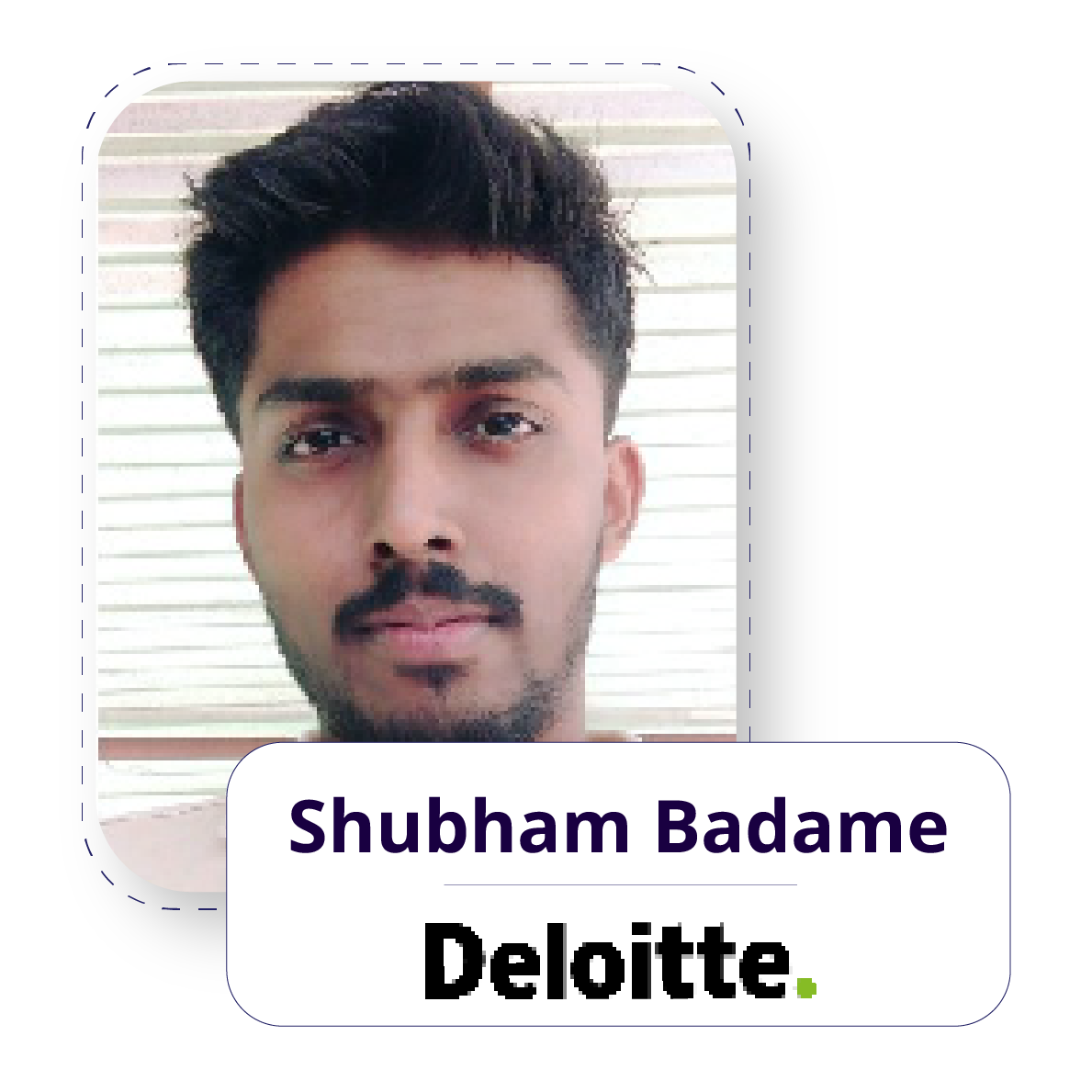
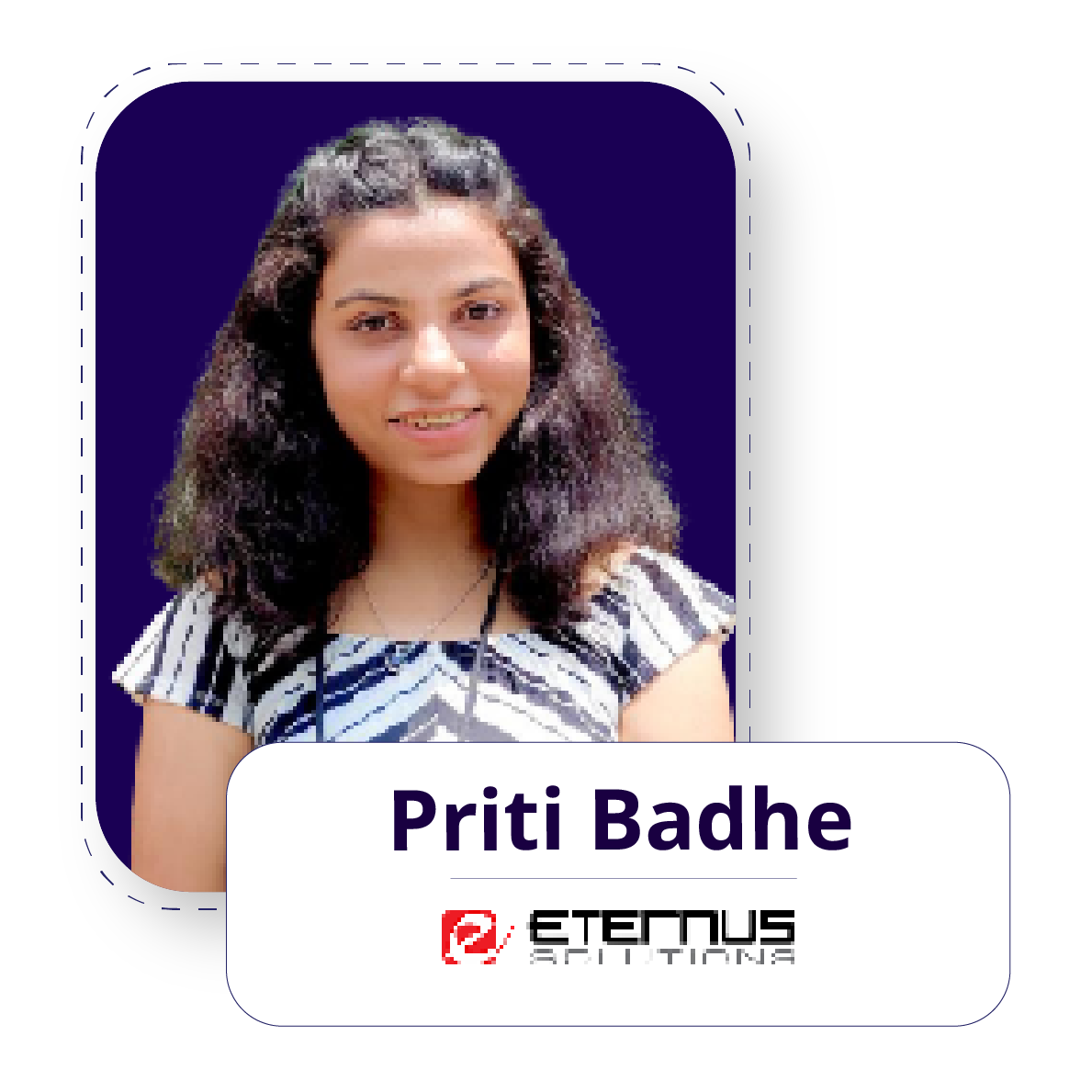
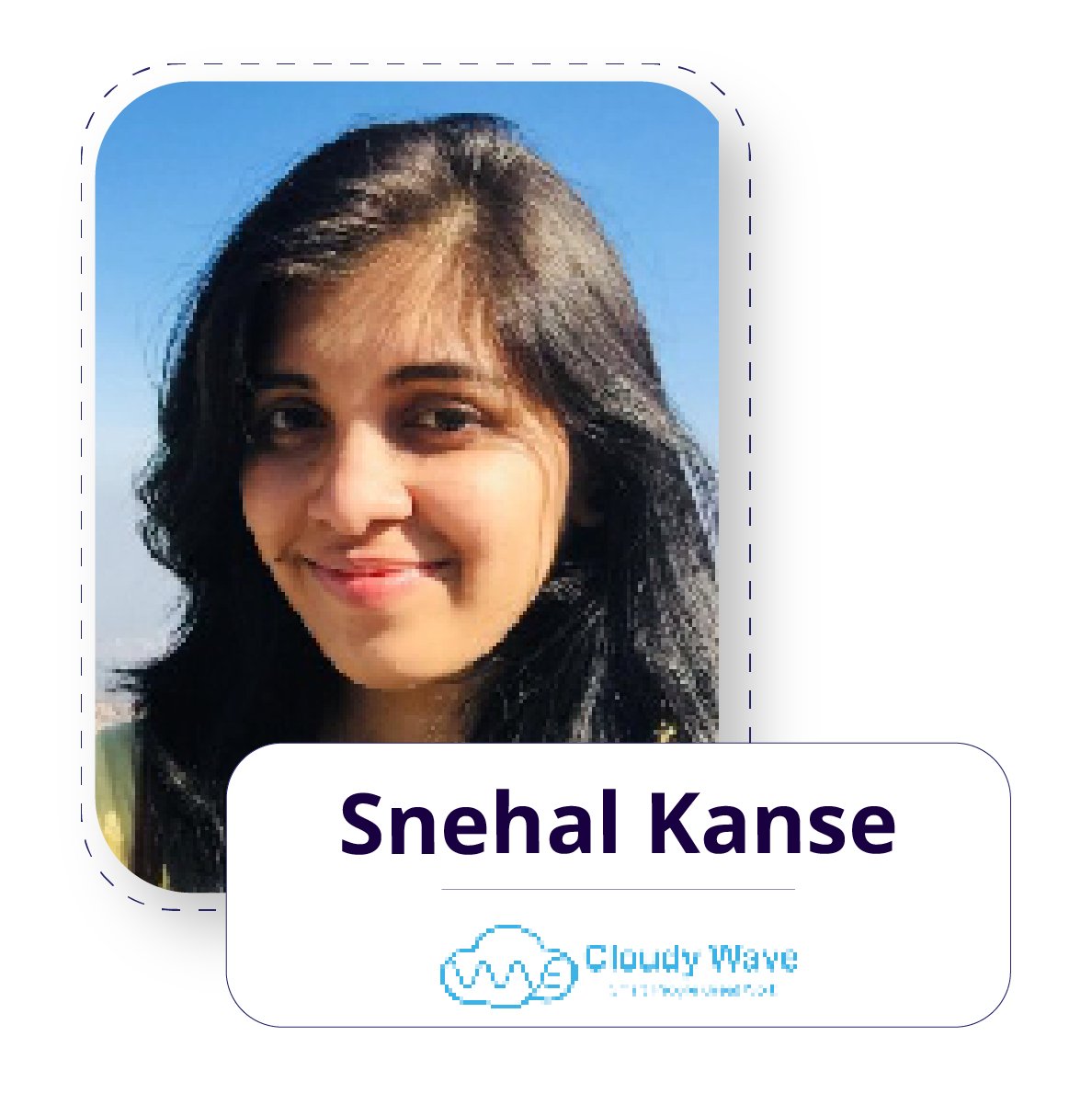


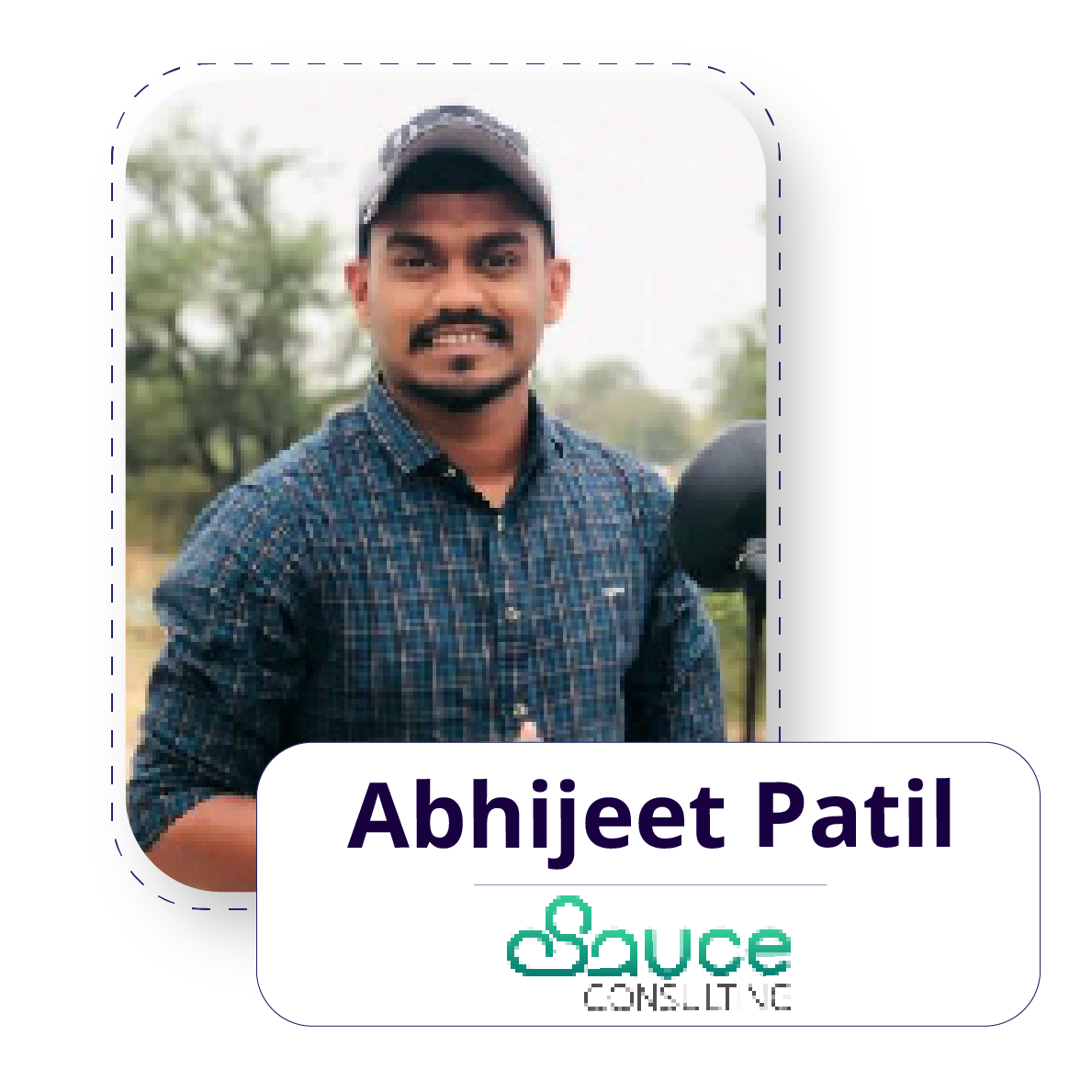
Meet Your Mentors

Unlock Career Growth with Salesforce
Explore the incredible power of Salesforce, a game-changing platform for managing sales, marketing, and customer service.
With over 150,000 companies using Salesforce, it’s the world’s leading CRM platform, making it a skill that can boost your career and beyond.
Start your journey to success with Salesforce today!
Who is eligible to enroll in this Salesforce Training Program?
Graduates (Technical and non-technical background)
Working professionals (Any field)
IT professionals who want a career switch
IT aspirants with a career gap
Women who want to restart their career journey
Why choose Salesforce through Premium Learning Systems
100% Practical Session
100% Placement Assistance
30000+Success Stories
Study Portal (LMS) one year access
Life Time Access of Job Portal
25+ Years Experience
Industry-Aligned Curriculum with Projects
Dedicated Mentorship Sessions
A Quick Snapshot of Your Journey
Fill out the Salesforce Course Registration Form to get started.
After registering, our team will contact you to provide all the details you need about the Salesforce course.
Dive into three months of focused Salesforce training filled with learning and growth.
Meet and collaborate with other Salesforce learners like yourself.
Secure a job at your dream company, celebrate with your classmates, and share your achievements online.
Salesforce Modules
Salesforce Admin
Session 1: Admin Basics
- Types of Relationships
- One To Many
- Difference between Master-detail and lookup relationship
- RollUp summary field
- Schema Builder
- Many To Many relationships
- Project Discussions
Session 2: Admin Basics
- Data Modelling – classroom exercises
- Formulae Fields
- Type of interview questions in Salesforce Technical interview
Session 3: Admin Basics
- Validation rules
- Most common Business cases of Validation Rules
Session 4: Salesforce Analytics
- Salesforce Analytics
- Dashboards
- Reporting snapshots
- About Trailhead
- Validation Rules – Data consistency
Session 5: Admin Basics
- Lookup Filter
Salesforce Admin-Salesforce Analytics, Java Basics
Session 1: Salesforce Analytics
- Summary Function
- Bucket field
- Custom Report type
- Report scheduling
- Folder security
- Dashboards
- Trend analysis using reporting snapshots
Session 2: Programming Basics 1
- Logic Building Roadmap
- Practice
- Check Solutions Online
- Use pen and paper
- Keep learning new things
- Be consistent and keep patience
- Face problems head – on
- Test yourknowledge in an online quiz
- Keep motivating yourself
- Revise
- Write it down
- Puzzle solving
- Have a step by step approach
- Register on Programmer’s community
Session 3: Programming Basics 2
- Java Basics
- Overview of Java
- Difference between Procedural Oriented language and Object Oriented language
- Instructions in Java
- Algorithm
- Variables
- Data Types
Session 4: Programming Basics 3
- GDB Online Compiler
- Demo of Data Type
- Operators in JAVA
- Demo of Operators
Salesforce Admin-(Business process automation), Sales Cloud, SOQL, Functional Salesforce
Session 1: Business process automation
- Workflow rules
-Definition
-Rule criteria
-Evaluation Criteria
-Actions
-Governor Limits - Process Builder
-Rule criteria
-Evaluation Criteria
-More actions
-Can be called
Session 2: Business process automation
- Approval Process
- Assignment rule
- Escalation Rules
- Auto response rules
Session 3: Sales Cloud
- What is a sales cloud?
- Why sales cloud?
- What are the benefits of a sales cloud?
- Features of sales cloud
- Sales cloud data model
- Sales cloud business processes
- Assignment
- Competitors of sales cloud
Session 4: SOQL
- What is SOQL?
- Why do we use SOQL?
- Business Cases
- Simple SOQL Queries
- SOQL Clauses
- SOQL operators
- Sub Query
- Relationship Query
- Dynamic query
- Governor limits
- SOSL Examples
Session 5: Functional Salesforce
- Functional salesforce
- Lightning Experience Vs Classic
- Audit
Salesforce Admin-Flows
Session 1: Flows
- Why Flows?
- What are Flows?
- Difference between Workflow, process builder, and flows.
- Types of Flows
-Screen Flow.
-Schedule-Triggered Flow.
-Record-Triggered Flow.
-Platform Event-Triggered Flow.
-Autolaunched Flow (No Trigger)
-Record-Triggered Orchestration - Screen Flow (Examples)
Session 2: Flows
- Screen Flow (Examples)
- Record-Triggered Flow
Session 3: Flows
- Record-Triggered Flow (Examples)
Session 4: Flows
- Autolaunched Flow (Examples)
- Record-Triggered Orchestration (Examples)
Session 5: Flows
- Schedule-Triggered Flow (Examples)
- Flow Test
Salesforce Admin-Flow Examples
Session : Flow Examples
Flow 1: -Send Email to admin
Flow 2: -Post chatter account details on changes in group
Flow 3: -Recreate ScreenFlow contact button click
Flow 4: -Assignment record type prospect to customer direct
Flow 5: -use literals and variables
Flow 6: -Change rating to hot
Flow 7: -change lead name as queue
Flow 8: -Before save Flow
Flow 9: -After save flow
Flow 10: -When Account type is Prospect
Flow 11: -To owner when Opportunity is closed won
Flow 12: -Shipping address changed to mailing address
Flow 13: -Ondelete closed lost opportunity
Flow 14: -Navigate to record page of contact
Flow 15: -Manager receives email when user deactivated
Flow 16: -isChanged operator
Flow 17: -Delete closed lost opportunity on button click
Flow 18: -Autolaunch flow task creation
Flow 19: -Create contact on account
Flow 20: -Change last name
Flow 21: -Count number of Opportunity
Flow 22: -Update status from verified to closed
Service Cloud
Session 1: Service Cloud
- Data loader
- Service cloud
Session 2: JDK installation
- JDK installation
- Eclipse installation
- Java Path setting
Session 3: VS code installation
- Vs code download
- Salesforce extension pack
- Salesforce CLI
Salesforce Admin-Salesforce Security Model
Session 1: Salesforce Security Model 1
- Why do we need security?
- What is the Security Model in Salesforce?
- Type of Security Model
- Object Level Security
- License in Salesforce
- Interview Questions
Session 2:Salesforce Security Model 2
- Record Level Security
- What is Role Hierarchy?
- Field Level Security
- Restriction Rules
- Business Case
- Interview Questions
Session 3: Programming Basics 4
- Control Structure
Session 4:Programming Basics 5
- Overview of Java
- Switch Control Structure
- Loops
Session 5: Core java 1
- What is JAVA?
- Basic Structure of JAVA Program
- What happens at compile time?
- What happens at runtime?
- What is JVM?
- JAVA Platform Independent
- Java Keywords
- Java Data Types
- Variables in JAVA
- Initialisation Of Variables
- Scope of Variables in JAVA
- Operators in JAVA
Session 6: Core Java 2
- Example of Assignment Operator
- JAVA Control Statement
Core Java
Session 1:Core Java 3
- LOOPS
- USER INPUT (SCANNER)
Session 2: Core Java 4
- Array
- For each loop
- String
Session 3: Core Java 5
- Multidimensional Array
- Two Dimensional Array
- Packages
Session 4: Core Java 6
- Classes and Objects
- Methods in Java
- Constructor
Session 5: Core Java 7
- Access Modifier
- OOPs
- Polymorphism
- Difference Between Method Overriding and Method Overloading
- Interview Questions
Core Java
Session 1:Core Java 8
- Encapsulation
-What is Encapsulation
-Advantages of Encapsulation
-Points to remember - Inheritance
-Types of Inheritance
-Why java does not support Multiple Inheritance. - Interview Questions
Session 2:Core Java 9
- Abstraction
- Difference between Abstraction and Encapsulation
- Interface
- Interview Questions
Session 3:Core Java 10
- Exception Handling
- Interview Questions
Session 4:Core Java 11
- Wrapper Classes
- Difference between Primitive Data type and Wrapper Classes
- Collection Framework
Session 5:Core Java 12
- Linkedlist
- Hashset
- Hashmap
- Collection Framework Comparison Advantages of Collection
- Interview Questions
Salesforce Development- Apex
Session 1: Apex
- What are programming tools?
- Why do we use it?
- Most common business cases of using Apex
- Modes of Deploying Apps in Salesforce
- Declarative Tools
- Programmatic Tools
- Why do we use Programming Tools?
- What is Apex?
- How many ways can we call Apex code?
- Basics of Apex
- Apex Trigger examples
Session 2: Apex
- Apex Trigger Business cases
- How to create Queues
- How to search for answers or logic?
- Account /lead triggers (before insert)
- SOQL use -out of for loop
Session 3: Apex
- What is the difference between before and after trigger?
- Why do we need After triggers?
- What is the difference between Trigger.new and Trigger.old?
- Apex trigger Examples
Session 4: Apex
- Apex trigger concepts
- Context variables
- Before Vs. After trigger
- Bulk triggers
- When are triggers not fired?
- Order of Execution
- Trigger Framework
Session 5: Apex
- Using Trigger.old and trigger.new
- Using limits – avoid duplicate creation
- Using maps – avoid deletion of child record based on parent record
Session 6: Apex
- Apex advance examples
Salesforce Development-Asynchronous Apex, Designing->(HTML, CSS)
Session 1: Asynchronous Apex
- Synchronous apex vs Asynchronous apex
- Advantages over synchronous apex
- Types of asynchronous apex
- Future Method
- Queueable Apex
Session 2: Asynchronous Apex
- Batch Apex
- Schedulable Apex
- Exception in Apex
- Interview Questions
Session 3: HTML
What is HTML?
- What is hypertext?
- What is notepad++?
- What is markup language?
- Basic Structure of HTML
- HTML Attributes
- Heading Content tags
- Paragraph tag
- List in HTML
- Tags in HTML
- Inline text semantics
- HTML Forms
- Types of fields in the FORM
- HTML5 Types of field
- HTML5 form validation
- HTML Table
- Points to remember
Session 4: CSS
- What is CSS?
- CSS Basics
- CSS Syntax Explanation
- Types of CSS
- Styling Texts
- CSS Box Model
- Gradients
- CSS Transitions
- CSS Animations
- Applications
Java Script
Session 1: Java Script
- What is Java Script?
- Structure of JS
- Styling of JS
- Functionality of JS
- Java Vs Java Script
- How compiler works
- How interpreter works
- Why Java Script?
- Node.js and Google VS Engine
- ES6 features supported to JS
- How does a web page load?
- What is Javascript
- HTML DOM?
- Why do we use Javascript?
- Common uses of Java Script
- Different browsers use different engines
- JS Interpreter
Session 2: Java Script
- What are Identifiers?
- Rules of legal name
- What are Literals?
- How to declare Variable?
- Variable
- keywords
- Data types in JS
- JS Arrays
- JS Objects
Session 3: Java Script
- Operators in JS
- Conditional Statements
Session 4: Java Script
- LOOPS in JS
Session 5: Java Script
- Map function
- Filter function
- OOPS in JS
- ES6 Spread Syntax
- ES6 class syntax
- Function Declaration in JS
- Events in JS
- Utility Functions
Session 6: Java Script
- How do we use Java Script?
- How to access DOM elements?
- Style DOM Elements
- Differences between inner HTML, innerText, textContent
Session 7: Java Script
- ECMAScript overview
- ECMAScript Analogy
- Arrow Function in JS
- Promises in JS
Lightning Aura
Session 1: Lightning Aura 1
- What is Salesforce?
- What is Salesforce Lightning?
- Why Salesforce Lightning?
- Difference between Salesfroce Classic and Salesforce Lightning
- Features of lightning
- What is Salesforce Lightning Platform?
- Features of Salesforce Lightning Experience
- Salesforce Lightning Components
- Benefits of Salesforce Lightning
- Demo of lightning app builder?
Session 2: Lightning Aura 2
- Salesforce lightning framework
- Aura Framework
- Why is Salesforce lightning popular?
- Why is the Salesforce lightning framework used?
- Salesforce Lightning Page
- Types of Components
- Lightning App Builder
- Salesforce Lightning Component library
- Salesforce Lightning Design System
- Lightning Application
- Demo of lightning custom component
- Files in custom component
Session 3: Lightning Aura 3
- Client Server Architecture
- Calling JS method from Component
- Attributes in JS
- Demo to use attributes and onclick event in JS
Session 4: Lightning Aura 4
- Conditional rendering using aura:if
- Aura Iteration using aura:iterator
- Calling Server Side
- Demo for aura:if
- Demo for aura:iterator
- Creation of Apex Server Side Controller
- @Auraenabled annotation
- Steps for calling server side
- Demo for server side calling
- What is enqueue Action?
Session 5: Lightning Aura 5
- Lightning Data Service (LDS)
- Data flow with Lightning Data Service
- What is force:record Data?
- Components based on LDS
- DML operation perform using LDS
- Demo of LDS
- Interview Questions of LDS
Session 6: Lightning Aura 6
- Events in salesforce
- Steps to use event
- Categorized events
- Demo of component and application event
- Aura Handler
- Event Propagation
Session 7: Lightning Aura Interview Questions
- Interview Questions and Answers
LWC-1
Session 1: LWC 1
- What is Lightning Experience?
- Why Lightning?
- Why not ReactJS or other Frameworks?
- What are Aura Components? 0
- What is the problem with Aura Components?
- What is Lightning web components(LWC)
- What is Component?
- What is a component based framework?
- Why is Salesforce shifting to LWC?
- Should we start with Aura or LWC?
- Difference between Aura And Lightning Component
- Advantages of LWC componentes over Aura component
- Why LWC?
- Web Component standards
- Key Features of ECMAScript Modules
- Web Stack 2014 and 2019
- How to install VS code?
- How to install CLI?
- Install Salesforce Extension Pack
- How to authorized org?
- First LWC Example
- A Lightning Web Component is defined
- What is a Lightning Component Library ?
Session 2: LWC 2
- What is a ShowToast Event?
- Example of ShowToast Event
- Break down of components
- What is Navigation Mixin?
Session 3: LWC 3
- Data Binding in LWC
- Components in LWC
Session 4: LWC 4
- Conditional Rendering in LWC
- Iteration or Loop in LWC
Session 5: LWC 5
- Decorators In LWC
LWC-2
Session 1: LWC 6
- Calling Apex Method Using WIRE Adapter
Session 2: LWC 7
- Example for wire as a Imperative call
- Wire a Method and DataTable Example
- What is Lightning Datatable
- Wire Vs Imperative Explanation
Session 3: LWC 8
- What is a Lightning Design System ?
- How to apply Styling in LWC
- How to set background image in LWC
Session 4: LWC 9
- What is Slots in LWC
- What is Progress Indicator
- Map in LWC
Session 5:LWC 10
- Lightning Data Service (LDS)
- Example of Lightning Record Form
LWC-3
Session 1:LWC 11
- Lightning Record Edit Form Example
- Lightning Record View Form Example
- Lightning Modals Pop Up
- Shadow DOM in LWC
Session 2:LWC 12
- What are EVENTS in LWC
- Component communication IN LWC
Session 3:LWC 13
- Custom Event Communication In LWC
- Propagation in LWC
Session 4:LWC 14
- LWC Lifecycle HOOK
- Publish Subscribe Model in LWC
Session 5:LWC 15
- Lightning Message Service
LWC Projects
Session 1:LWC 16
- Revision of all topics
- Project – Ticket Booking System project
- Data Modal,LWC Components, Apex class
Session 2:LWC 17
- Continue Building Ticket Booking System project
- Apex class
Session 3:,LWC 18
- Continue Building Ticket Booking System project
- Apex Trigger Project – Cab booking System project
DataModal,,Flows,Apex Trigger, ApexClass,LWC Components
Session 4:,LWC 19
- Continue Building Cab booking System project
Session 5:,LWC 20
- Continue Building Cab booking System project
Session 6:,Interview Questions
- Interview Questions and Answers
Deployment and Testing Framework, SOAP and REST API
Session 1:Deployment and Testing Framework
- Software Development Life Cycle
- Types of Salesforce org
- Deployment and Testing Framework
- What is Deployment?
- Deployment Process
- Deployment Tools
- Packages
- Workbench
- Testing Framework
- Apex testing
- Interview Questions
Session 2: Deployment and Testing 2
- Agenda
- What is Test Class in Salesforce?
- Key points about Test Classes in Salesforce
- What is Unit testing?
- Why Unit tests needed?
- Benefits of Apex unit tests
Which components need to be tested - Basic Syntax of Test Class
- Best Practices Of Test Classes In Apex
- Annotations in Test Class
- Methods used in Salesforce test classes
- Where to write Test Class?
- Examples
- How to check the output of test class?
- What is a Test Suite?
- What are the Assert methods?
- Key points while writing a test classes
- Best practice and Notes of salesforce test class
- Interview Questions
Session 3: SOAP and REST API
- What is API?
- What is Web Service?
- Types of Web Services
- Rest API
- SOAP API
- Difference between Rest and SOAP API
- InterviewQuestions
Salesforce Learning Experiences from Our Students
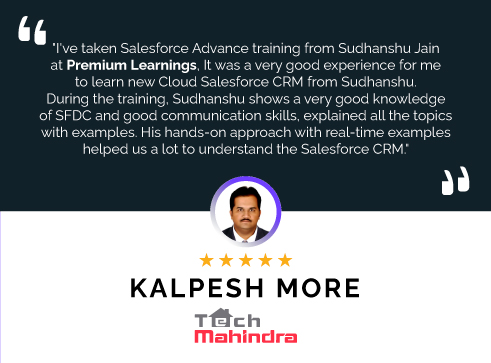
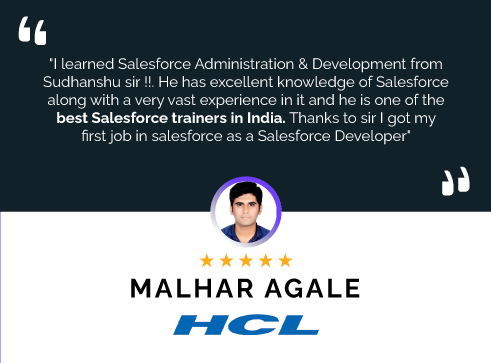
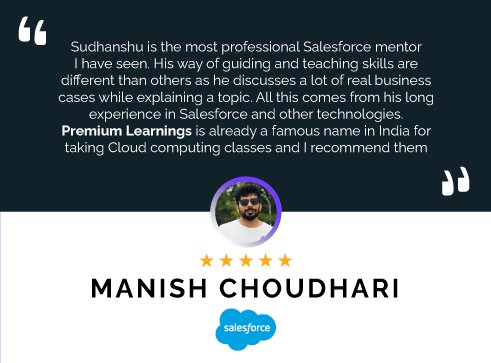
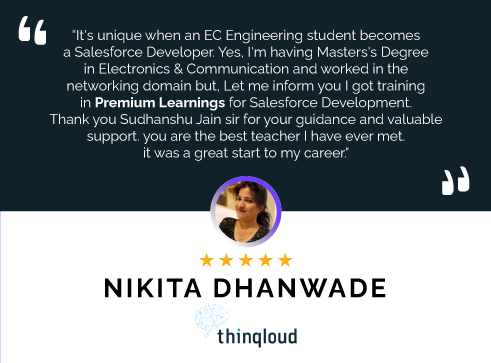
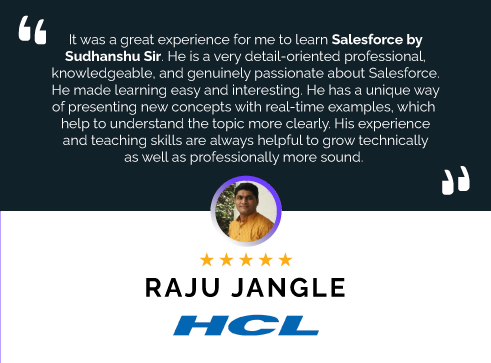
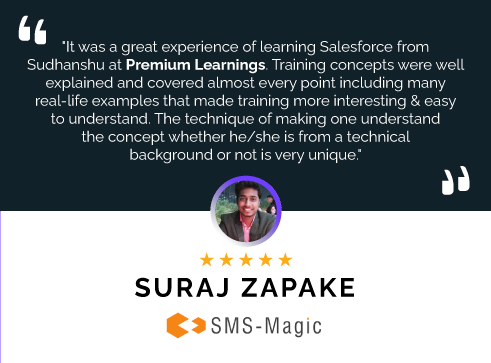
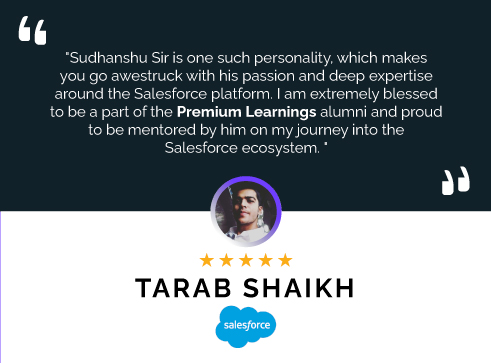


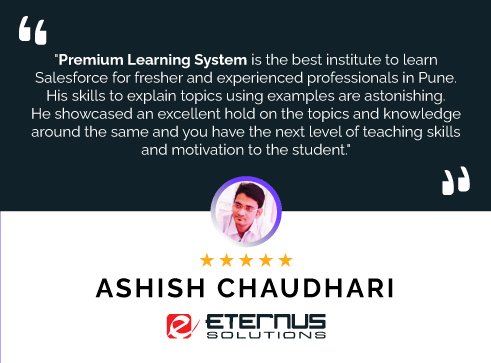









Why you need to do salesforce ?
A. 9.3 Million Job Projection by 2026:
The demand for Salesforce experts worldwide is skyrocketing. By 2026, there will be over 9.3 million job opportunities waiting for skilled professionals like you.
Source: (Salesforceben.com)
B.Salary Hikes of Up to 200%:
Completing our program can lead to huge salary increases. Some people have even seen their pay jump by up to 200% after finishing our course!
Source: (Based on Our Student Success Story)
C. 90% of the Fortune 500 customers rely on Salesforce :
Salesforce, trusted by 90% of Fortune 500 companies, boasts a bright future as the leading CRM platform, poised to continue revolutionizing customer relationships.
Source: (Salesforceben.com)
D. 30% Year-on-Year Increase in Job Postings:
The number of job openings for Salesforce experts in India is growing fast. Every year, there’s a 30% increase in the number of jobs available.
Source: (Salesforceben.com)
D. 27% Remote Positions in 2024:
Salesforce offers flexible work options. In 2024, around 27% of jobs allowed professionals to work from home, giving you more freedom in your career.
Source: (Salesforceben.com)
E. Over 10,000 Salesforce Partner Companies in India:
India has a huge network of companies that use Salesforce. With over 10,000 partner companies, there are plenty of opportunities for you to find your dream job in different industries.
Source: (Salesforceben.com)
Before You Ask
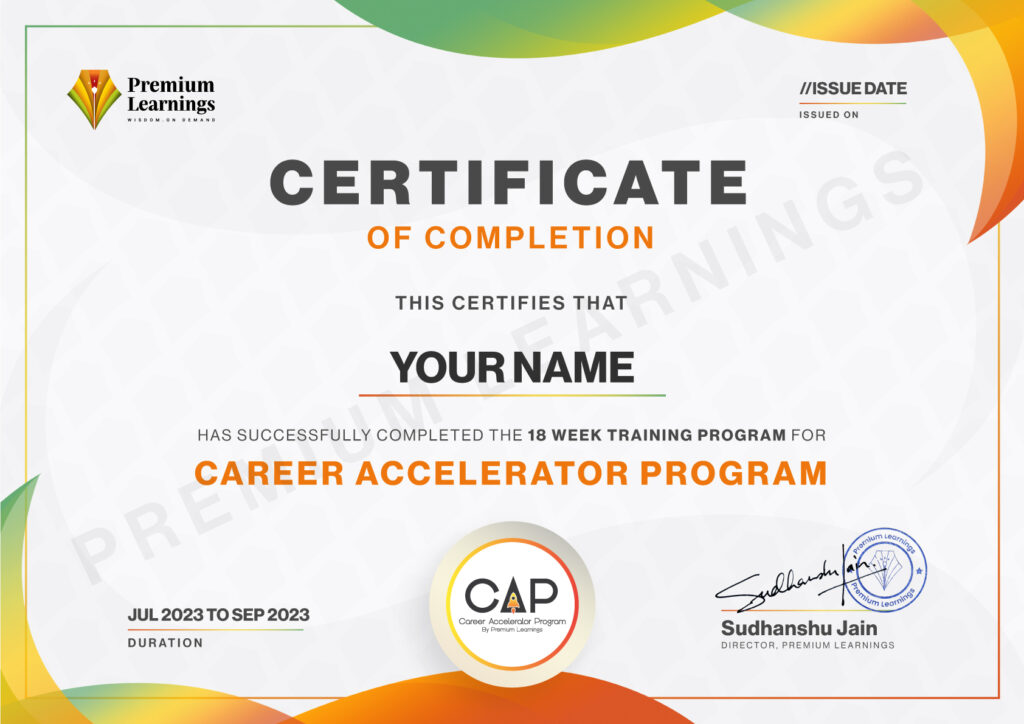
Validate your learning
Receive an official certificate signed by your mentor vouching that you’ve completed the course and validate your learning with shareable proof.
Show it off!
Flaunt your Premium Learning's Certificate on your CV or your LinkedIn and wow prospective employers.
Frequently Asked Questions
What kind of jobs can I get after completing my Salesforce course?
After completing our course and acquiring Salesforce skills, you can pursue various job roles such as Salesforce Administrator, Developer, Consultant, Business Analyst, and Marketing Specialist. These roles span across industries and offer competitive salaries.
I am a Fresher Can I join this Course?
Absolutely! We've helped countless students with career gaps transition into the IT sector with success. Your gap doesn't define your potential; our courses prepare you for a rewarding IT career regardless of your background.
I have a career gap. Can I enter IT again with a good package?
Absolutely! We've helped countless students with career gaps transition into the IT sector with success. Your gap doesn't define your potential; our courses prepare you for a rewarding IT career regardless of your background.
What is the course duration?
Our program spans over 3 months, featuring real-world projects. Additionally, we provide job assistance, mock resume building, and hands-on project work, ensuring you'll be job-ready in just 3 months.
Will I get a certification for this course?
Yes, upon completion of the course, you will receive a certification validating your skills and knowledge in Salesforce.
I am already working as a Salesforce professional. If I do this course, what will I benefit?
Even as an experienced Salesforce professional, this course offers numerous benefits. You'll gain advanced insights, refine your skills, and stay updated on the latest industry trends. Additionally, you'll have the opportunity to expand your network, access real-world projects, and potentially enhance your career prospects with new certifications. Many of our alumni have experienced salary hikes of up to 200% after completing our program.



